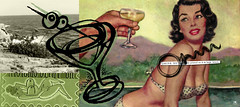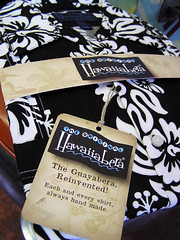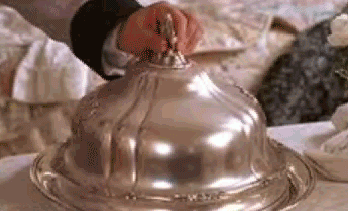Exclusive to NYT & NLM
By JON PARELES
LONDON
MIDWAY through one of their four instantly sold-out concerts in June at the Brixton Academy in London, the reunited Pixies charged into "Monkey Gone to Heaven," a song about apocalypse and faith. The audience — some who had seen the Pixies between 1986 and 1992, and an equal contingent of younger fans getting their first glimpse — all knew what to do as Frank Black started to sing the song's reverse countdown: "If man is five/ Then the devil is six/ And if the devil is six/ Then God is seven."
At 39, he looked less like a rock star than ever: bald, portly, dressed in a shapeless T-shirt. He barely glanced at Kim Deal, 43, the band's bassist and occasional singer. Yet as he worked his way from a strangled, nasal whine to a shriek, the whole room sang along, and thousands of hands shot into the air with fingers raised on cue: five, six, seven. The crowd couldn't have been more enthusiastic if the song, released in 1989, were in the current Top 10.
The Pixies have been rapturously received since they started touring in April, and have been one of the few unqualified successes in a summer filled with foundering tours. Reunions are a staple in the concert business, as acts from Simon and Garfunkel to the Eagles to Duran Duran to the Sex Pistols periodically reappear. Affection for the oldies is one draw; so is the possibility that every reunion is the last chance to see a group. Nostalgia seems to peak after two decades, and lately the postpunk bands of the 1980's have been regrouping — among them, Mission of Burma, which sold out a club tour last year and went on to make a new album.
But the response to the Pixies reunion has been greater by orders of magnitude. It wasn't just the shows in smaller venues that sold so briskly; more than 50,000 tickets were snapped up for the Pixies' day at the Coachella festival, and theaters around the United States have quickly sold out for multiple dates. The Pixies were to perform at the New York stop of the Lollapalooza Festival this month, which had already sold 11,000 tickets when the entire tour was canceled. Instead, they will have New York dates on Dec. 12 and 13 at the Hammerstein Ballroom. Meanwhile, the company DiscLive has been offering instant live recordings of every concert by the reunited group. Those CD's, in numbered limited editions of 1,000 or 2,000, are selling out, too, and turning into instant collectors' items available for handsome mark-up on eBay.
Charles Michael Kittredge Thompson IV, a k a Frank Black, who called himself Black Francis on the Pixies' recordings, claimed to be unimpressed. Pixies audiences were enthusiastic for most of the group's initial career, he said. Now, he added, there are more curiosity-seekers. "I'm wondering if there's a large section of the audience that kind of isn't really getting it," he said. "That's good. It gives us an opportunity to preach to the still-not-converted."
It's an arty underdog's attitude that seems to be a holdover from the band's first time around. The Pixies, who got started in Boston in 1986, became hit-makers in England and Europe. Yet in the United States, they never quite broke out of the collegiate rock circuit, even after they were signed to a major label, Elektra. Those who discovered the Pixies have cherished their catalog ever since. When the band played Coachella on May 1, one visitor's license plate read, "DEBASR," for "Debaser," the Pixies song about (among other things) the Surrealist film "Un Chien Andalou."
Black Francis's songs for the Pixies were terse but wild-eyed. As he sang about the Bible, science fiction, incest or immigration, the music could sound like punk or country, surf-rock or metal. Joey Santiago's lead guitar laced the music with twangy little hooks or solos that threatened to skid right out of the song; Ms. Deal answered Black Francis's hopped-up vocals with calm, airy responses, and David Lovering's drums paced the music from brisk to quasi-Latin to booming. Quiet verses suddenly gave way to howling, stomping choruses — a tactic that would be commandeered by the Pixies' most influential and grateful fan, Kurt Cobain of Nirvana.
The songs are full of musical and verbal non sequiturs, but skewed as they were, a decade and a half later they sound like irrepressible pop. And at a time when rock has grown sodden with earnestness and self-pity, the Pixies' songs sound like a corrective; they're smart, lightheaded, profound and comic, and they rock with a vengeance.
That was the idea from the beginning. "I got exposed to some Surrealist films of the 1920's and 30's and 40's or whatever in college, read a couple of articles, attended a couple of lectures," Mr. Thompson said in an interview between shows in London. "And I applied all of that in a really fumbly kind of way to having a rock band. It was going to be quirky but in a really simple, brief, swift fashion. It was like, `Oh yeah, I'm going to add something or I'm going to take something away so that it's a little bit lopsided or whatever.' Because when it's just a foursquare thing, it at least stands a 50-50 chance of being boring, cliché-ridden, heard-it-before. When you lop off one corner of it, well, I don't know if it's boring or not. But it's definitely something that you've not heard before.
"Now people pursue rock music, and they go, `I have something important to say, and here's what it is, and ooh, I'm singing it from my heart, too.' And it's all too serious. And people totally miss out. They totally miss the fun, Jabberwocky, fun-with-language, fun-with-poetry."
From the beginning, the Pixies were diligent. They practiced five hours a day, four days a week, in Mr. Lovering's garage. "We wouldn't be able to play if we didn't figure out what we were going to play," Ms. Deal recalled. "We could not jam. I still can't jam."
They invested $1,500 to make a demo tape that eventually yielded songs for the band's punk-flavored 1987 debut EP, "Come On Pilgrim." With the producer Gil Norton polishing their dynamics, the Pixies went on to make two indelible albums, "Surfer Rosa" (1988) and "Doolittle" (1989), and two solid ones, "Bossanova" (1990) and "Trompe le Monde" (1991). And they toured steadily for five years, from hole-in-the-wall punk clubs to European rock festivals.
The grind of traveling gradually frayed the band. "It's intense being on tour," Mr. Thompson said. "You're cooped up in a bus with a bunch of different personalities — people you know, people you don't know. You're on a weird time schedule. Sometimes there's a lot of drinking and drugs and all, sleep deprivation. It's kind of a weird situation."
By the end of a final tour, opening for U2 and facing audiences that barely knew them, Mr. Thompson was no longer speaking to Ms. Deal. In 1992, he dissolved the Pixies via faxes sent from his manager's office. "If I would have called a meeting or something, then it would have just kind of devolved into this big discussion," he said " `Oh, come on, Charles. Don't do this right now.' And I just wasn't up for that. I was just, like, I'm done. I'm done. Goodbye. There's no discussion, you know what I mean?"
Ms. Deal went on to start the Breeders, who had a million-selling album in 1993 with "Last Splash" but struggled to follow through. Mr. Thompson renamed himself Frank Black and started writing more straightforward songs than his Pixies material; Mr. Santiago worked on and off with Frank Black's bands and started a band called the Martinis with Mr. Lovering in the mid-90's. More recently, Mr. Lovering gave up drums and was scraping out a living as a magician until the call came to rejoin the Pixies. He still keeps a deck of cards close at hand and has sometimes been the Pixies' opening act. "I love the Pixies," he tells crowds who may not recognize his name. "I've been to every one of their shows."
The Pixies reunion, Mr. Thompson said, started as a joke. Or maybe it wasn't exactly a joke, but some combination of wish and strategy. He isn't about to say. But last July, while on tour with his own band, he was doing an interview on a London radio station when he was asked the question he had been asked in every interview he had given for the last 12 years: Would the Pixies ever reunite? And for the first time, he allowed that there just might be the possibility of a reunion.
The news zipped across the Internet to fans who had been waiting since the Pixies ended their six-year career in 1992, and anticipation started to build. Mr. Thompson had joked with the interviewer that the Pixies were still jamming and working on new songs, but he also said that any time he envisioned a Pixies reunion, it was like the classic anxiety dream of being unprepared in public. Still, in August he quietly held some strategy meetings with his manager and booking agent. He called Mr. Santiago, who called Ms. Deal. "I just went, `Oh really?' " Ms. Deal said. "But Joe was telling me, `This could be a change of school district for me. This is important to me.' And because of that I said I'd do it."
The band members, now in their 30's and 40's, are temperate on tour these days. Over dinner, Mr. Thompson and Ms. Deal drank nonalcoholic beer. In London, Mr. Santiago was joined by his pregnant wife, Linda, and his year-old daughter; Mr. Lovering played host to his parents.
The Pixies have recorded a new song together, written by Ms. Deal, called "Bam Thwok," which was originally written for the soundtrack to "Shrek 2." But the movie company chose a song by Counting Crows instead, and "Bam Thwok" ended up helping to inaugurate the European version of iTunes.
Marc Geiger of the William Morris Agency, the band's longtime agent, says he is hoping the Pixies will record a new album early next year. "I have thought of that concept, yes," Mr. Black said. "I wouldn't mind asking Tom Waits to produce us. Why not? I like the way his records sound."
But the band members are resolutely not looking ahead. They have kept the tour as familiar as possible; not just the songs but their business associates, lighting director and sound man are the same as they were the first time around. In Brixton, even the backstage caterer was the same as on the Pixies' last visit to the same theater in 1991.
"There's surprisingly little déjà vu on this tour," Mr. Thompson said. "It's more like just a continuation. It's like there's a bunch of songs. We played them to death in the late 80's and early 90's for a period of about five years. So, a bit of a long sabbatical. Now we're playing them again. And there really isn't any mystery."





















